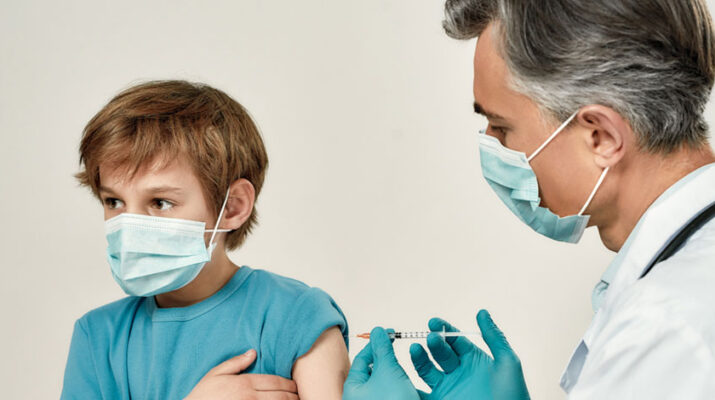Skipping or delaying a child’s vaccination may put them at risk
By Deborah Jeanne Sergeant
While the eyes of the world have focused on COVID-19 vaccination, some parents have missed their children’s routine vaccination. During the onset of the pandemic last year, the Centers for Disease Control and Prevention advised delaying all non-emergency visits. Once doctor’s offices reopened for these visits, some parents did not feel comfortable bringing their children in and still others faced long delays as doctors have scrambled to catch up on backlogged well child visits, the appointments when they typically administer these vaccines.
“Early on, people were afraid to come to the office,” Steven Lana, pediatrician with Delaware Pediatrics in Buffalo. “Children were missing out on well visits, screening exams, and preventive care, and vaccinations.”
Currently, parents may bring in their child after they set up an appointment and as long as no one in the household is sick or has been in contact with someone sick with COVID-19 or has traveled out of state.
Most facilities encourage only one parent or guardian to come into the office with the patient and require masks for anyone older than the age of two. Normally, vaccines begin at two months of age.
Skipping childhood vaccines “is a bad idea,” Lana said. “A vaccine delayed is a vaccine denied. These diseases we immunize against have not gone away because of COVID-19. Meningitis, pneumonia, whooping cough, rotavirus, measles, diphtheria, tetanus, mumps rubella and chicken pox, are all still there lurking. When vax rates go down, children become vulnerable to things that are preventable. We’ve become complacent because vaccines have become so effective at eliminating diseases that people don’t have firsthand experience at suffering from them.”
Many of today’s young parents do not know anyone who experienced polio or other vaccine-preventable diseases, so they believe that they have been eradicated or that they are not all that serious.
Some parents believe that skipping vaccination toughens up their children’s immune systems to become better at warding off disease. Sarah Ventre, pediatrician with UBMD Pediatrics in Buffalo and clinical assistant professor of Pediatrics, University at Buffalo, said that the opposite is true.
“Vaccination is a tool for your body to protect itself,” she said. “When children are given vaccine, their immune system can build up the antibodies if and when exposed in the future.”
She likens vaccination to providing the body with a “dress rehearsal” for when the body is exposed to the illness.
Anecdotal evidence of problems caused by vaccines usually arise because of a coincidental event, such as the timing of routine vaccine happens to occur once children are developmentally capable of being diagnosed with autism.
Other parents feel concern about side effects such as mild malaise.
“Most parents do have concerns about side effects of vaccines,” Ventre said. “The important thing is that the reaction to a vaccine is not necessarily a bad thing. To have a fever, body aches or tiredness within 24 to 48 hours is a normal side effect and a sign the vaccine is doing its job. The benefits of vaccinations far outweigh the possible side effects.”
Of all medication, vaccines represent the most tested. The long-term use of vaccines with rare and minimal side effects point to the safety of vaccines.
Some parents fear that their young children receiving multiple vaccinations in one or two injections may experience an “overload” of exposure that could unduly tax their immune systems. However, everyday exposures such as petting the family dog, crawling across the floor, placing objects in their mouths and many other common interactions expose children to many germs repeatedly all day.
“We are concerned because of the pandemic, there will be a larger number of children with missed vaccine doses because of COVID 19,” said Gale Burstein, physician and commissioner of health for the Erie County Department of Health. “People haven’t been practicing healthcare in person as they usually have for recommendations.”
Although data is not yet available for Erie County, she said that national data indicates lower numbers of vaccinations compared with previous years.
HPV and influenza are two of the vaccinations that Burstein has observed families skipping. Neither is required for school attendance (although the routine vaccinations are required for children who are attending school remotely). Administered to children beginning at around age 11 in two doses, HPV prevents certain cancers. HPV requires two doses, as does meningitis.
“Those get more easily missed,” Burstein said.
The rapid spread of COVID-19 should underscore how easy it is for a communicable disease to go global without vaccine or any natural immune response. Reintroduction of “eradicated” diseases is only a plane trip away.
“The vaccines that are available for children and adults prevent some very serious diseases,” Burstein said. “It’s important that people keep themselves and their children up to date on their vaccines.”
Anyone lacking insurance can call 855-355-5777 to obtain insurance. New York participates in the CDC’s Vaccines for Children program so that the vaccine is free. Parents pay only for the healthcare visit.

